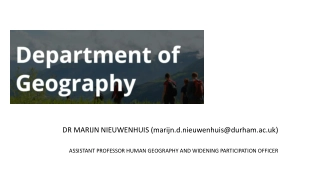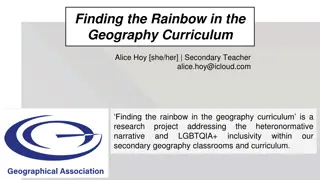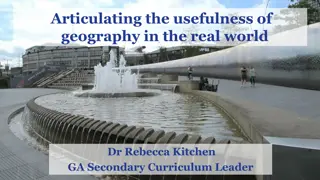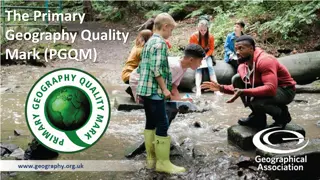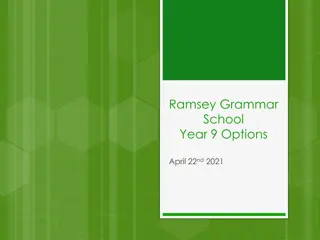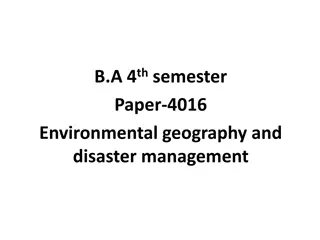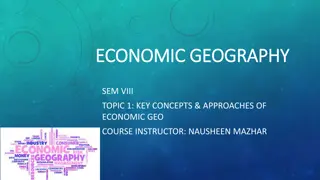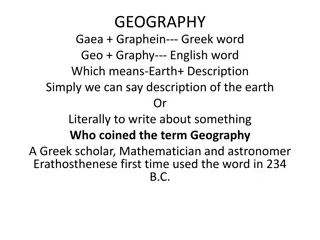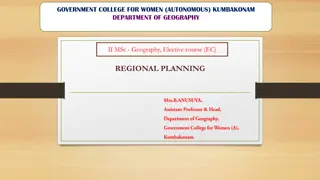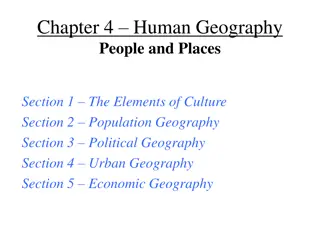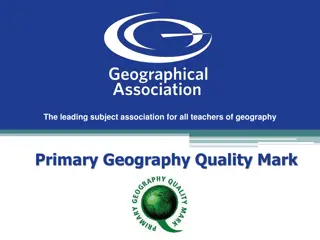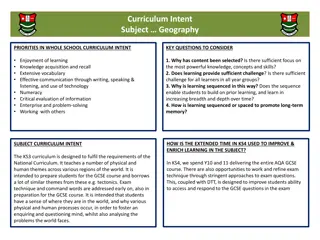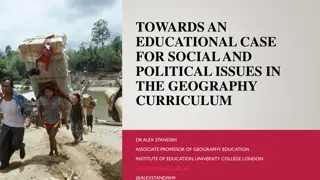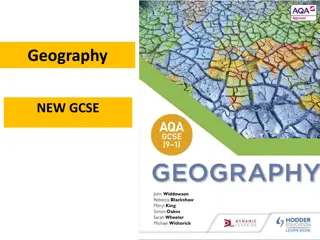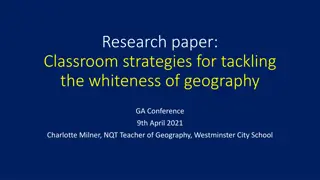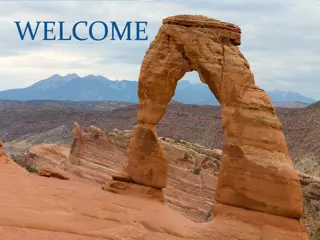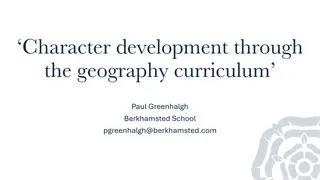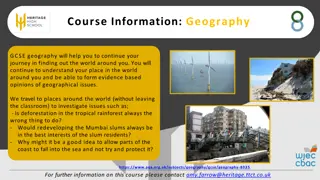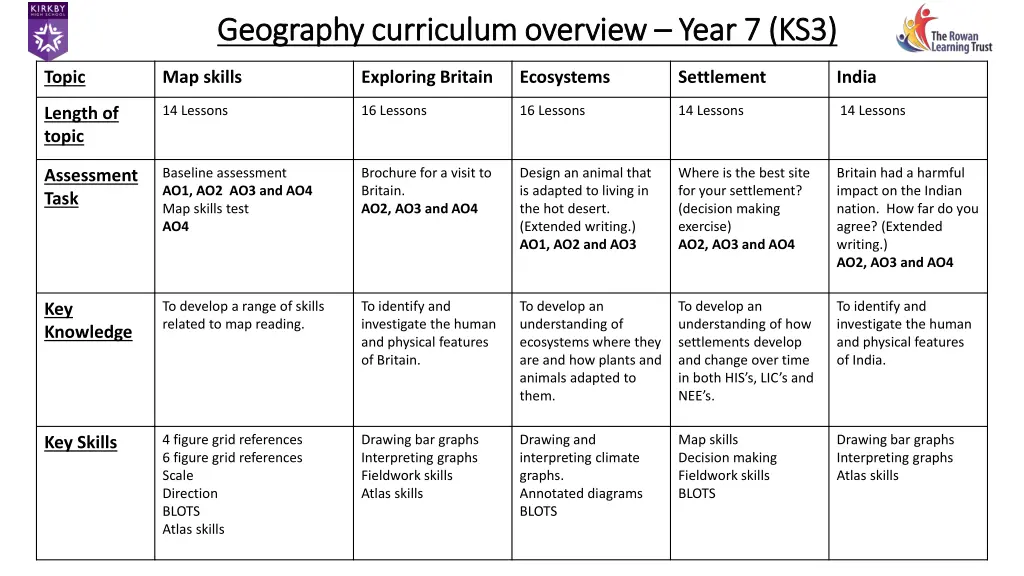
Exploring Geography Curriculum for Key Stage 3 Students
Dive into the comprehensive Geography curriculum for Year 7, 8, and 9 students focusing on map skills, ecosystems, settlements, tectonics, globalisation, extreme hazards, and more. Students engage in various activities, assessments, and tasks to develop key geographical knowledge and skills.
Uploaded on | 0 Views
Download Presentation

Please find below an Image/Link to download the presentation.
The content on the website is provided AS IS for your information and personal use only. It may not be sold, licensed, or shared on other websites without obtaining consent from the author. If you encounter any issues during the download, it is possible that the publisher has removed the file from their server.
You are allowed to download the files provided on this website for personal or commercial use, subject to the condition that they are used lawfully. All files are the property of their respective owners.
The content on the website is provided AS IS for your information and personal use only. It may not be sold, licensed, or shared on other websites without obtaining consent from the author.
E N D
Presentation Transcript
Geography curriculum overview Geography curriculum overview Year 7 (KS3) Year 7 (KS3) Topic Map skills Exploring Britain Ecosystems Settlement India 14 Lessons 16 Lessons 16 Lessons 14 Lessons 14 Lessons Length of topic Baseline assessment AO1, AO2 AO3 and AO4 Map skills test AO4 Brochure for a visit to Britain. AO2, AO3 and AO4 Design an animal that is adapted to living in the hot desert. (Extended writing.) AO1, AO2 and AO3 Where is the best site for your settlement? (decision making exercise) AO2, AO3 and AO4 Britain had a harmful impact on the Indian nation. How far do you agree? (Extended writing.) AO2, AO3 and AO4 Assessment Task To develop a range of skills related to map reading. To identify and investigate the human and physical features of Britain. To develop an understanding of ecosystems where they are and how plants and animals adapted to them. To develop an understanding of how settlements develop and change over time in both HIS s, LIC s and NEE s. To identify and investigate the human and physical features of India. Key Knowledge 4 figure grid references 6 figure grid references Scale Direction BLOTS Atlas skills Drawing bar graphs Interpreting graphs Fieldwork skills Atlas skills Drawing and interpreting climate graphs. Annotated diagrams BLOTS Map skills Decision making Fieldwork skills BLOTS Drawing bar graphs Interpreting graphs Atlas skills Key Skills
Geography curriculum overview Geography curriculum overview Year 8 (KS3) Year 8 (KS3) Topic Tectonics Globalisation Human hazards Rivers Amazing places 18 Lessons 7 Lessons 24 Lessons 14 Lessons 14 Lessons Length of topic Nepal earthquake AO1, AO2 and AO3 Montserrat decision making (both extended writing) AO1, AO3 and AO4 Milk prices (extended writing) AO1, AO3 and AO4 Mapping crime (fieldwork) AO3 and AO4 The effects of civil war (extended writing) AO2 and AO3 Rivers test AO2 AO3 and AO4 Should we develop Antarctica? (extended writing) AO1, AO3 and AO4 Assessment Task To develop an understanding of plate tectonics and the impacts these have on the people who live in these areas. To develop an understanding of what globalisation is and its effects. To develop an understanding the causes, effects and responses to hazards created by humans. To develop a understanding of the features and processes of a river. To develop an understanding of human effect places both positively and negatively around the world. Key Knowledge Maps skills Annotating diagrams Identifying primary and secondary affects Identifying responses Map skills Annotating diagrams Ranking Decision making Fieldwork skills Drawing graphs Identifying responses and effects (primary and secondary) Map skills Map skills Drawing and Annotating diagrams. Identifying key features. Map skills Drawing and Annotating diagrams. Identifying key features. Identifying effects (primary and secondary Key Skills
Geography curriculum overview Geography curriculum overview Year 9 (KS3) Year 9 (KS3) Topic China Extreme Hazards Africa Coasts Introduction to GCSE 14 Lessons 24 Lessons 14 Lessons 14 Lessons 11 Lessons Length of topic Why do companies set up their factories in China? (extended writing) AO1, AO2 and AO3 Storm Frank (extended Writing) AO1, AO2 and AO3 Comparing hurricanes (extended writing) AO2 AO3 and AO4 Boy soldiers (extended writing) AO2 AO3 and AO4 Human Use of the coast. (extended writing) AO2 AO3 and AO4 Decision making exam AO2 AO3 and AO4 Assessment Task To identify and investigate the human and physical features of Africa. To develop an understanding the causes, effects and responses to extreme hazards. To identify and investigate the human and physical features of Africa. To develop a understanding of the features and processes of the coast. To begin to develop skills needed at GCSE through the use of a decision making exercise. Key Knowledge Drawing bar graphs Interpreting graphs Atlas skills Identifying primary and secondary affects Identifying responses Maps skills Annotating diagrams Identifying primary and secondary affects Identifying responses Drawing bar graphs Interpreting graphs Atlas skills Identifying primary and secondary affects Identifying responses Map skills Drawing and Annotating diagrams. Identifying key features. 4 figure grid references 6 figure grid references Scale Direction BLOTS Atlas skills Decision making Key Skills
Geography curriculum overview Geography curriculum overview Year 10 (KS4) Year 10 (KS4) Exam board: AQA Exam board: AQA Topic The challenge of natural hazards. Urban Issues and Challenges UK landscapes and River Landscapes Fieldwork Resource management and Water management. Tectonic hazards:12 lessons Weather Hazards: 14 Lessons Climate Change: 9 lessons The urban World :10 lessons Urban challenges in the UK: 17 lessons UK landscapes: 3 lessons River landscapes: 12 lessons Human Fieldwork: 12 lessons and 1 day out of school to collect data Physical lessons: 12 lessons 1 day out of school to collect data Resource management:6Lessons Water Resources:10 lessons Length of topic (in lessons) 3.2.1 Section : Urban issues and challenges 3.1.3 Section C: Physical Landscapes in the UK 3.1.3.1 UK Physical landscapes 3.1.3.3 River landscapes in the UK 3.3.2 Section B: Fieldwork 3.2.3 Section C: The challenge of resource management. 3.2.3.1 Resource management 3.2.3.3 Water 3.1.1 Section A: The challenge of natural hazards 3.1.1.1 Natural Hazards 3.1.1.2 Tectonic Hazards 3.1.1.3 Weather Hazards 3.1.1.4 Climate Change Links to specification Exam question once per week completed. Written feedback given for students to responds to. End of topic assessment to identify gaps in learning. Two lessons built into the unit to address gaps in knowledge. Exam question once per week completed. Written feedback given for students to responds to. End of topic assessment to identify gaps in learning. Two lessons built into the unit to address gaps in knowledge. Exam question once per week completed. Written feedback given for students to responds to. End of topic assessment to identify gaps in learning. Two lessons built into the unit to address gaps in knowledge. Exam question once per week completed. Written feedback given for students to responds to. End of topic assessment to identify gaps in learning. Two lessons built into the unit to address gaps in knowledge. Exam question once per week completed. Written feedback given for students to responds to. End of topic assessment to identify gaps in learning. Two lessons built into the unit to address gaps in knowledge. Assessment Task(s) Earthquakes and volcanic eruptions - physical processes Effects / responses of tectonic hazard vary between areas of contrasting levels of wealth Management Global atmospheric circulation model Tropical storms development and effects on people and environment Extreme weather events in the UK and impacts on human activity Climate change (natural and human causes and effects) Managing climate change mitigation and adaptation A growing percentage of the world s population lives in urban areas. Urban growth creates opportunities and challenges for citied in LICs and NEES. Urban change in cities in the UK leads to a variety of social, economic and environmental opportunities and challenges. Urban sustainability requires management of resources and transport. The UK has a range od diverse landscapes. The shape of a river valleys changes as rivers flow downstream.. Distinctive fluvial landforms result from different physical processes. Different management strategies can be used to protect river landscapes from the effects of flooding. Suitable question for geographical enquiry. Selecting, measuring and recording data appropriate to chosen enquiry. Selecting appropriate ways of processing and presenting fieldwork data. Describing, analysing and explain fieldwork data. Reaching conclusions. Evaluation of geographical enquiry. Food, water and energy are fundamental to human development. The changes demand and provision of resources in the UK create opportunities and challenges. Demand for water resources is rising globally but supply can be insecure, which may lead to conflict. Different strategies can be used to increase water supply. Key Knowledge Cartographic skills Graphical skills Numerical skills Statistical skills Use of qualitive and quantitative data Cartographic skills Graphical skills Numerical skills Statistical skills Use of qualitive and quantitative data Cartographic skills Graphical skills Numerical skills Statistical skills Use of qualitive and quantitative data Cartographic skills Graphical skills Numerical skills Statistical skills Use of qualitive and quantitative data Formulate enquiry and argument Cartographic skills Graphical skills Numerical skills Statistical skills Use of qualitive and quantitative data Key Skills
Geography curriculum overview Geography curriculum overview Year 11 (KS4) Year 11 (KS4) Exam board: AQA Exam board: AQA Topic The changing UK economy. The Living World The Development gap and Nigeria a newly emerging economy Coastal landscapes Revision Issue evaluation. 10 lessons Ecosystems:3 lessons Tropical Rainforest: 8 lessons Hot Deserts: 8 lessons The development gap: 10 lessons Nigeria: a newly emerging economy: 9 lessons 12 lessons Amount time will determined by when we finish teaching content. 6 to 8 lessons. Length of topic (in lessons 3.2.2 Section B: The changing economic world 3.1.2 Section B: The living World 3.1.2.1 Ecosystems 3.1.2.2Tropical rainforests 3.1.2.3 Hot deserts 3.2.2 Section B: The changing economic world 3.1.3 Section C: Physical Landscapes in the UK 3.1.3.2 Coastal landscapes of the UK Paper 1: Living with the physical environment. Paper 2: Challenges in the human environment. Paper 3: Geographical applications. 3.3.1 Section A: Issue evaluation Links to specification Exam question twice per week completed. Written feedback given for students to responds to. Assessment Task(s) Exam question once per week completed. Written feedback given for students to responds to. End of topic assessment to identify gaps in learning. Two lessons built into the unit to address gaps in knowledge. Exam question once per week completed. Written feedback given for students to responds to. End of topic assessment to identify gaps in learning. Two weeks built into the unit to address gaps in knowledge. Exam question once per week completed. Written feedback given for students to responds to. End of topic assessment to identify gaps in learning. Two weeks built into the unit to address gaps in knowledge. Exam question once per week completed. Written feedback given for students to responds to. End of topic assessment to identify gaps in learning. Two weeks built into the unit to address gaps in knowledge. Exam question twice per week completed. Written feedback given for students to responds to. Major changes in the economy of the UK have affected, and will continue to affect, employment patterns and regional growth. Ecosystems exist at a range scales and involve the interaction between biotic and abiotic components Tropical rainforest ecosystems have a range of distinctive characteristics. Deforestation has economic and environmental impacts. Tropical rainforests need to be managed. Hot deserts ecosystems have range of distinctive characteristics. Development of hot deserts environments creates opportunities and challenges. Areas on the fringe of hot deserts are at risk of desertification. There are global variations in economic development and quality of life. Various strategies exist for reducing the global development gap. Some LICs and NEEs are experiencing rapid economic development which leads to significant social, environmental and cultural change. The coast is shaped by a number of physical processes. Distinctive coastal landforms are the result of rock type, structure and physical processes. Different management strategies can be used to protect coastlines from the effects of physical processes. Review, revise and recall learning on both human and physical geography units. Contributes a critical thinking and problem-solving element. T Develop knowledge and understanding of physical and human geography themes from the compulsory elements of the course.. Consider and select a possible option in relation to issue(s) and justify their decision. Key Knowledge Review, revise and recall learning on human and physical fieldwork. Cartographic skills Graphical skills Numerical skills Statistical skills Use of qualitive and quantitative data Cartographic skills Graphical skills Numerical skills Statistical skills Use of qualitive and quantitative data Cartographic skills Graphical skills Numerical skills Statistical skills Use of qualitive and quantitative data Cartographic skills Graphical skills Numerical skills Statistical skills Use of qualitive and quantitative data Cartographic skills Graphical skills Numerical skills Statistical skills Use of qualitive and quantitative data Cartographic skills Graphical skills Numerical skills Statistical skills Use of qualitive and quantitative data Key Skills



